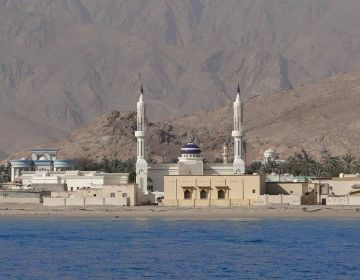
Teaching English in the Middle East
Teaching English in the Middle East is a fantastic opportunity to live and work in a new part of the world. It’s home to beautiful desert landscapes and world wonders like the Pyramids of Giza and the ancient ruins of Petra, which means there are plenty of exciting adventures to be had.
As a teach abroad destination, the general requirements can be strict and demanding, but the high salaries and fantastic benefits make it worthwhile. In fact, the Middle East is one of the best places to teach abroad and save money. However, the region is typically best suited for those with a degree in education and a teaching license. But there are opportunities for those with only a four-year degree and a TEFL certificate, too.
Benefits of Teaching in the Middle East
Teaching English in the Middle East typically offers:
- Earn high salaries and enjoy fantastic benefits like flight reimbursement and/or a housing stipend.
- Interview in advance and secure a job before moving abroad
- Add valuable professional experience to your resume.
- Make meaningful connections abroad.
- Step outside of your comfort zone and see unique destinations throughout the Middle East

Typical Requirements to Teach English in the Middle East
- A Bachelor’s degree at minimum, sometimes a master’s is preferred
- Native-level ability in English
- Previous teaching experience, preferred
- A reputable TEFL certificate and/or a teaching license
Every country in the Middle East has its own specific job requirements, so it's imperative to research your desired destination properly. Additionally, whether or not you need a degree in education and a teaching license depends on the hiring school.
5 Best Places to Teach English in the Middle East

The United Arab Emirates
Teaching English in the United Arab Emirates is known as one of the highest-paying teach abroad destinations, and ESL teachers enjoy a tax-free salary! However, the UAE has a high cost of living, especially in bigger cities like Dubai and Abu Dhabi, where most teaching positions can be found. Thankfully, many schools provide teachers with a housing allowance to help offset this expense. Many teachers aspire to find work at a public school through the UAE Ministry of Education.
Average monthly salary: $2,000-$5,000+/month

Oman
Oman is a relatively unknown teach abroad destination, but it actually boasts a high demand for English teachers. It's another place that offers tax-free salaries and exceptional benefits like reimbursed airfare and furnished housing.
Average monthly salary: $2,000-$3,000+/month

Saudi Arabia
Saudi Arabia has risen in recent years to become a hub for ESL teachers because of the country's high demand for English and its many job openings. Teaching in Saudi Arabia offers excellent benefits like subsidized housing and flight reimbursement. It’s important to note that Saudi Arabia holds some of the strictest laws in the Middle East, including a ban on alcohol and a strict dress code for local women. Because of this, teachers must be adaptable and arrive with an open mind. However, the nation offers an incredibly unique and rewarding professional experience for those interested in experiencing life there.
Average monthly salary: $2,000-$4,000+/month
Other Countries in the Middle East to Teach Abroad

Qatar
Teaching English in Qatar is a rewarding but competitive prospect. This small nation is an attractive destination for ESL teachers thanks to high, tax-free salaries and furnished housing benefits. But because it’s small, there are limited positions available. To get a job teaching here, you'll most likely need a four-year degree or higher, a reputable TEFL certificate, previous experience, and to be a native English speaker. Most positions can be found in the country's capital city of Doha.
Average monthly salary: $1,500-$2,500/month

Morocco
When you think of teaching in the Middle East, you may not consider teaching English in Morocco. However, this incredible North African country boasts a blend of European and Arabic cultures influenced by its locale in Africa, making it an incredible place to live and teach abroad. Teaching salaries aren't the highest compared to other Middle Eastern countries, but it's enough to cover the cost of living. It also means that a 120-hour+ TEFL certificate and a four-year degree are typically enough to secure a job.
Average monthly salary: $500-$1,000/month
Types of Teaching Jobs in the Middle East
Most teaching opportunities in the Middle East are concentrated in the region’s big cities, and most teachers find work at public schools, private language academies, or international schools. However, it varies by country.

Public Schools
Countries like the United Arab Emirates, Oman, and Morocco have government-sponsored jobs at public schools. Public school teachers typically work with younger students at elementary and secondary schools. In the UAE, public schools offer some of the best-paid positions in the nation.

Foreign Language Schools
The private ESL sector is the most popular job opportunity in the Middle East for those who don't have a teaching license but only a TEFL certificate and a four-year degree. These positions are more varied and usually provide teachers with the choice to work with children, university students, or professional adults. Teachers should properly vet all teaching prospects as private institutions can sometimes be shady.

International Schools
International schools in the Middle East are a fantastic opportunity for ESL teachers and native-speaking teachers in general. Many international schools teach an American or British curriculum, which means there's a need for English speaking teachers in various subjects.
To qualify for a job at an international school, you'll likely need a bachelor's or master's degree in education, a TEFL certificate, a teaching license, and previous experience. International schools may list openings on their website or with recruiting agencies.
Frequently Asked Questions
You’ve got questions. We’ve got answers.
The most common ways to find teaching positions in the Middle East are through online job boards, recruiting agencies, or applying directly to schools.
- Job boards like Ed Arabia and Naukri Gulf are great places to start your job hunt in the Middle East.
- Recruiting agencies are also a popular way to find teaching jobs abroad, and Footprints Recruiting and Search Associates are two reputable companies to consider.
- Applying directly to schools is another option.
These travel bloggers shed light on their experiences living and working in the Middle East.
- Teaching in Abu Dhabi, UAE: Your Questions Answered! By Exploring Kiwis
- Teaching English in Saudi Arabia by Graced Journey
- How to Teach English in Egypt by Mike & Laura Travel
- Omani Living, The True Test Of Expat Living by I Luv 2 Globe Trot
Because the Middle East as a region typically places great emphasis on education, aspiring ESL teachers may be expected to have a reputable TEFL certificate with at least 120 hours. Choosing a TEFL certificate with an in-class component or TEFL practicum is also essential. A TEFL practicum places trainee teachers in a real-world classroom to gain valuable hands-on experience.
CIEE 150-Hour TEFL
CIEE TEFL is an internationally trusted brand recognized for being one of the best TEFL providers in the industry. CIEE has a proven track record of helping graduates secure teaching jobs abroad and equips teachers with the confidence needed to succeed.
CIEE TEFL's 150-hour certification makes it easy to complete your TEFL training online in just three months. This comprehensive course includes:
- 130 hours of ACCET accredited coursework
- 20-hour TEFL practicum
- Instruction by highly qualified TEFL tutors
- Lifetime job search assistance
Teachers can generally earn upwards of $1,500 to $5,000+ per month teaching English in the Middle East.
Gulf states like the UAE, Qatar, and Saudi Arabia typically offer the highest salaries. But they also have the strictest job requirements, expecting teachers to have a bachelor's degree in education (master's often preferred), as well as a TEFL certificate and previous experience.
In other Middle Eastern states like Jordan, Morocco, and Israel, the job requirements are less strict, but the salaries are a little lower too. However, this is balanced out by the relatively low cost of living in these countries.

